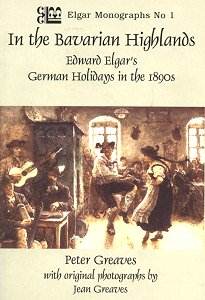BOOK REVIEW
In the Bavarian Highlands
by Peter Greaves
Elgar Monographs No. 1; 96 pp Elgar Enterprises. - £5.99

This is the first of a series of monographs published in association with
the Elgar Society. During the 1890s, Edward
Elgar and his wife Alice had holidays in Southern Bavaria in five separate
years. These inspired the set of six choral songs under the name "From the
Bavarian Highlands". Three of these were orchestrated and published as "Bavarian
Dances".
Peter Greaves had undertaken intensive research on these holidays and provided
maps and detailed itineraries for each holiday together with numerous photographs
of existing buildings and contemporary portraits. Letters by the Elgars and
by their guests are quoted at length. These provide a detailed picture of
a type of holiday which is barely possible today. These holidays clearly
represented the highlights of the time when Elgar was leading a happy life
with his wife and many friends. It was fascinating to read that they travelled
mainly first class, although they could ill afford it.
The description of the music and how it was received is interesting and there
is a useful bibliography and discography. It is a must-read for the Elgar
enthusiast. It is published by Elgar Enterprises.
Arthur Baker
This Review first appeared in the Bulletin of the Federation of Recorded
Music Societies ©
Elgar - "The Best of Me"
The Best Of Me; A Gerontius Centenary Companion;
Edited By Geoffrey Hodgkins.
Elgar Enterprises - £18.
Some members of Recorded Music Societies spend quite a lot of their time
trying to select what they consider the best recording of their favourite
works and, if one of these is Elgar's Dream of Gerontius, they will
find information listing all the commercial recordings and comments on the
quality of the recordings themselves together with opinions on the performers'
interpretations.
One chapter contains a print-out of the complete poem on which it is based
indicating the sections which Elgar selected. This shows quite clearly the
manner in which Elgar "translated" the work to reflect his own religious
views while still not offending those of any others.
This 340 page volume is an "expansion" of a collection of articles that have
appeared previously in the journals of the Elgar Society and in the public
press which seek to record the history of the evolution of The Dream
from the time that Elgar was first presented with a copy of the poem to some
of the occasions when the cantata was actually performed and recorded.
Although it is somewhat repetitious in its references to the first public
performance, and it has to be said that it was not alone in "failing" at
the first fence the contributions from such persons as J A Fuller Maitland
and Mrs Richard Powell (Dorabella in the Enigma Variations) are
interesting to have on public record. Indeed, the chapter entitled "Birchwood
in Summer, 1900" being an extract from her book, Edward Elgar: memories
of a variation, by Dorabella captures the whole essence of Elgar, his
personality, his serious yet happy approach to life and his music as nowhere
else in the book. When reading this chapter for the first time, however,
I did not allow myself to be diverted from her delightful narration by reading
the innumerable cross referencing notes at the bottom of almost every page.
The nearest to a careful and detailed analysis of the work is contributed
by Andreas Friesenhagen who examines the layout of individual movements and
comments on the progressive key signature plan.
While various contributors remark on the presence of leitmotifs, no
actual musical illustrations are offered and these must have been as important
in Elgar's mind as they were in Wagner's.
A full chapter has been contributed by John Norris giving a biography of
John Henry Newman, the composer of the poem in 1865. It would appear that
the concept of the poem, the central idea of a soul's journey through the
afterlife, was recurrent in his sermons delivered when in Oxford.
I sometimes feel, however, that perhaps through over-enthusiasm or an excess
of desire to find what is there, some musicologists find ideas and thoughts
that never occurred to the composer or writer.
The book contains an excellent series of photographs of the countryside between
Bransford and Powick; of Elgar playing golf; of Sherridge and Birchwood Lodge
where Elgar undertook the bulk of his work on the Dream. The considerable
contributions made and encouragement given by Jaeger are quite correctly
attributed, but the sources of artistic inspiration are extremely complex
and it could be dangerous on occasions even to conjecture what they may have
been. The entire production reflects the scholarly and affectionate approach
adopted by the chief editor and his assistants.
John Kemsey-Bourne
This Review first appeared in the Bulletin of the Federation of Recorded
Music Societies ©
